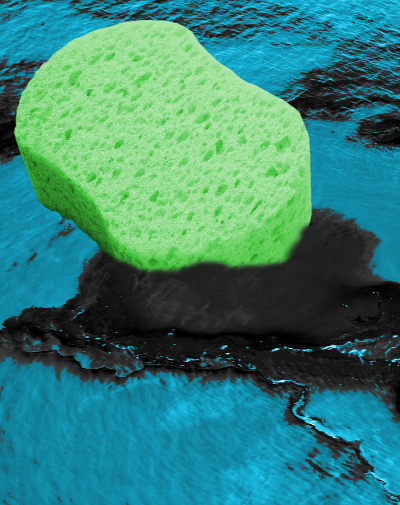Waste repurposed for spill sponge
 Engineers have made a new oil spill sponge out of common waste products.
Engineers have made a new oil spill sponge out of common waste products.
The Australian research project seeks to make polluted beaches, oily water, dead birds and marine life destruction caused by crude oil spills a thing of the past, using an absorbent polymer – itself made from waste products from the petroleum and refining industries.
In an environmental win-win, the new type of polymer made from waste cooking oil and sulphur (a by-product of the petroleum industry) has the ability to clean up crude oil and diesel spills.
Better still, because the highly buoyant polymer acts like a sponge to absorb the waste materials from sea water, the polymer can be squeezed to recover the oil and then reused.
“This is an entirely new and environmentally beneficial application for polymers made from sulphur,” says Dr Justin Chalker, leader of an international research team responsible for the discovery and lecturer in synthetic chemistry at Flinders University.
“This application can consume excess waste sulphur that is stockpiled around the globe and may help mitigate the perennial problem of oil spills in aquatic environments.”
About 7000 tonnes of crude oil spilled from tankers into oceans in 2017 alone.
A recent large oil spill off Borneo, for example, and prompted Indonesian authorities to declare a State of Emergency.
The international team of researchers say the effects of recent large-scale spillage catastrophes clearly demonstrate the necessity of their research – in particular, the explosion on the Deepwater Horizon offshore drilling rig in 2010 and subsequent release of approximately 4.9 million barrels of crude oil into the Gulf of Mexico.
“This is a new class of oil sorbent that is low-cost, scalable, and enables the efficient removal and recovery of oil from water,” says Dr Chalker.
The researchers used the common waste substances – canola oil from cooking, sulphur which is a by-product of the petroleum industry, plus sodium chloride – to create an inexpensive and sustainable sorbent that can mitigate the ecological harm of oil pollution.
Sulphur and cooking oils are hydrophobic, so the new the polymer has an affinity for hydrocarbons such as crude oil and diesel fuel, and can rapidly remove them from seawater.
More information is available here, and in the video below.







 Print
Print